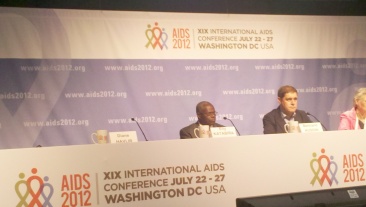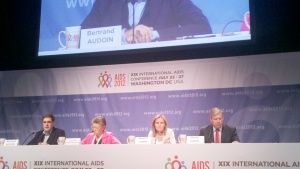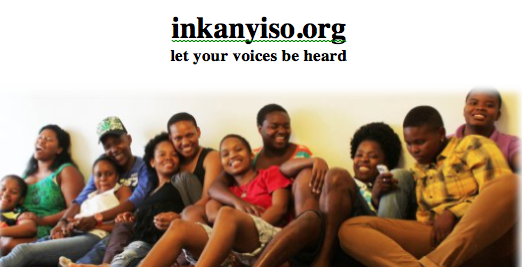While the Question still looms about the criminalization of homosexuality in Africa, Scientific, Political and Community Leaders Call for Collaborative Partnerships and Investments in Research, Treatment and Prevention to Turn the Tide on HIV
Melanie Nathan, July 27, 2012
 Friday, 27 July 2012 (Washington, D.C., United States) —The global AIDS community concluded its biennial meeting today with a clear sense that the end of the AIDS epidemic is possible with sustained financial, political and scientific commitment. As delegates and organizers depart Washington, D.C., where the conference opened 22 July under the theme Turning the Tide Together, they understand that though a vaccine or cure is still necessary, scaling up resources and the tools available today has the potential to save millions of lives. Only with coordinated efforts to expand HIV prevention and treatment initiatives, integrate HIV programs into broader health services, maintain funding, and improve human rights across vulnerable populations will the international community begin to end the AIDS epidemic. Yet not enough was discussed about homophobia and the reality of msm in countries that criminalize and drive many infected people undergorund.
Friday, 27 July 2012 (Washington, D.C., United States) —The global AIDS community concluded its biennial meeting today with a clear sense that the end of the AIDS epidemic is possible with sustained financial, political and scientific commitment. As delegates and organizers depart Washington, D.C., where the conference opened 22 July under the theme Turning the Tide Together, they understand that though a vaccine or cure is still necessary, scaling up resources and the tools available today has the potential to save millions of lives. Only with coordinated efforts to expand HIV prevention and treatment initiatives, integrate HIV programs into broader health services, maintain funding, and improve human rights across vulnerable populations will the international community begin to end the AIDS epidemic. Yet not enough was discussed about homophobia and the reality of msm in countries that criminalize and drive many infected people undergorund.
“AIDS 2012 has brought delegates together from around the world to Washington, D.C. – with one aim in mind – to turn the tide on the HIV epidemic. We have seen breaking science, exciting strategizing for a cure, sessions for the young and old affected by HIV, to name just a few. The success of the Global Village and the Youth Programme has galvanized the efforts of the activists and young scientists who will be the future of our fight to end AIDS,” said Dr. Elly Katabira, AIDS 2012 International Chair, President of the International AIDS Society (IAS) and Professor of Medicine at Makerere University in Kampala, Uganda. “As International Chair, I would like to commend everyone for their tireless efforts to make AIDS 2012 a truly great conference, and I urge delegates to maintain the momentum.”
I had the opportunity in an pre-closing press conference to ask Dr. Katabira about The Anti-Homosexuality Bill in Uganda, noting that I had met many Ugandan gay people, who while free to be gay when visiting this country for the AIDS 2012 Conference, may be driven further undergound in Uganda if the the languishing Anti-Homosexuality Bill were to ever pass in Parliament. I asked what his organization suggests.
Dr Katabira, pictured above left, said: I have been asked that question many times. The Bill has not yet passed Parliament in my country and may never pass in its present form.” He noted that it has not passed because of all the pressure from the advocates inside and outside Uganda. He then suggested that the pressure be kept up from both inside and outside Uganda against passage of the Bill.
AIDS 2012 drew nearly 24,000 participants from 183 countries. The week-long programme featured 194 sessions covering science, community and leadership. The conference was supported by almost 1,000 volunteers from all over the United States and other countries.
“AIDS 2012 represented many milestones in the history of the International AIDS Conference, but most importantly, it is the first time we have been united around the one goal to end AIDS,” said Dr. Diane Havlir, AIDS 2012 U.S. Co-Chair and Professor of Medicine at the University of California, San Francisco. “Serious dialogue is now happening about collaboration among the diverse communities involved in this effort – science, advocacy, faith, and vulnerable populations. In the face of all of this optimism, I am humbled by the job ahead of us, but this meeting has inspired me. I know we will keep moving toward our shared goal of ending AIDS.”
Thousands of delegates signed the Washington, D.C. Declaration, the official declaration of the XIX International AIDS Conference. The declaration states that we must strive for multi-disciplinary approaches that respect and uphold the human rights and dignity of all people affected by the epidemic and calls for nine concrete actions. Sign the declaration online at www.dcdeclaration.org or www.2endaids.org
At the Closing Session, U.S. House of Representatives Democratic Leader Nancy Pelosi said, “The International AIDS Conference is focused on solutions, care, and a cure, bringing together experts, policy makers, and people living with HIV around a single goal: ending the HIV/AIDS pandemic once and for all. HIV/AIDS is a challenge that knows no borders, and the United States must continue to invest in treatments and prevention at home, while working to restore a future of hope and health to communities around the world.”
The session also featured a keynote address by President William J. Clinton.
Incoming IAS President and AIDS 2014 International Conference Chair Prof. Françoise Barré-Sinoussi gave an inaugural address. Barré-Sinoussi, a Nobel Laureate, is Director of the Regulation of Retroviral Infections Unit at the Institute Pasteur in Paris.
At the conclusion of the Closing Session, Katabira, Havlir and Barré-Sinoussi officially transferred the International AIDS Conference globe from Washington, D.C., to Melbourne, Australia, which will host the XX International AIDS Conference in July 2014. Accepting the globe for Melbourne were AIDS 2014 Australia Chair Sharon Lewin, Professor of Medicine at Monash University, and representatives of the AIDS 2014 local partners.
Victoria’s Health Minister, David Davis, said the Australian health policy response to HIV involves a high degree of partnership between government, scientists and civil society sharing a commitment to care and support of people living with HIV/AIDS and ending the HIV epidemic. “As the hosts of AIDS 2014, Australia will lead collaborative, global dialogue on the diagnosis, treatment and prevention of HIV/AIDS, sharing the benefits of such partnerships with other countries.”
Let us hope by 2014 that the looming threat of Uganda’s Anti-Homosexuality Bill and all abhorrent government acts of criminalization and the resulting persecution will be eradicated, as Africa and other countries realize it does nothing more than impede human rights for all, including the human right to sexuality so that LGBTI people entitled to education, prevention and treatment are not driven underground.
Melanie Nathan
[email protected]




















 PoochParkWear customizes hoodies and t-shirts, the good, the naughty, the in between, whether proud or quirky let them be seen. We also offer biker jackets, croc or pleather collars, a variety of collar charms, and our special Zinja beaded collars made by a co-op of HIV-positive South African women, the Sisonke women who weave the beads onto the collars.
PoochParkWear customizes hoodies and t-shirts, the good, the naughty, the in between, whether proud or quirky let them be seen. We also offer biker jackets, croc or pleather collars, a variety of collar charms, and our special Zinja beaded collars made by a co-op of HIV-positive South African women, the Sisonke women who weave the beads onto the collars.

Trackbacks/Pingbacks
[…] Read more Share this:FacebookPrintEmail This entry was posted in Health/Mental Care and tagged Health Care, HIV/AIDS by Victoria. Bookmark the permalink. […]
[…] (IAS) and Professor of Medicine at Makerere University in Kampala, Uganda noted the importance of fighting against the Anti-Homosexuality Bill by local activists and international community […]